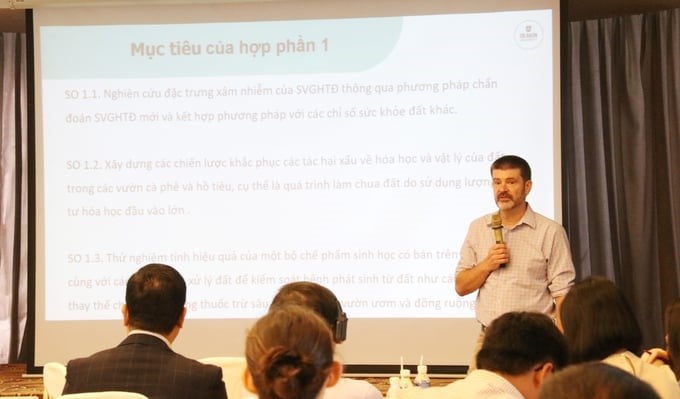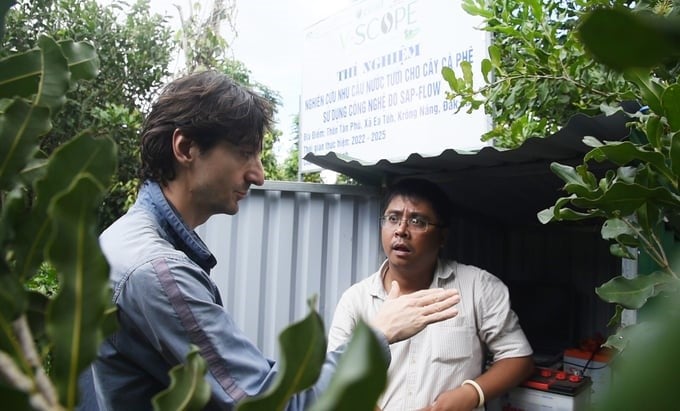May 20, 2025 | 11:40 GMT +7
May 20, 2025 | 11:40 GMT +7
Hotline: 0913.378.918
May 20, 2025 | 11:40 GMT +7
Hotline: 0913.378.918
Recently, the Project "Increasing the sustainability, productivity, and economic value of coffee and black pepper farming systems and value chains in the Central Highlands region of Vietnam" (V-SCOPE Project) held a mid-term review meeting as well as organized field visits for relevant parties.

Experts presented research results for components of the project. Photo: Quang Yen.
This mid-term meeting also heard reports from components of the project. In particular, the components have published research results on methods of controlling pests and diseases in farms and nurseries as well as improving soil health for coffee and black pepper farming.
Through research, the results of the investigation of harmful organisms in soil in 2022 and 2023 show that the symptom rate of quick wilt disease on black pepper plants is 1–5% in all three Central Highlands provinces. About 69% of soil samples collected from the investigated areas had the presence of Phytophthora fungi, mostly at very low densities.
In this component, three species that cause quick wilt disease on black pepper plants in the Central Highlands were also recorded. In testing soil restoration measures in coffee and black pepper gardens, it was found that some gardens in Gia Lai had increased pH, but longer monitoring was needed.
In addition, the V-SCOPE Project has also achieved some specific results in the component on co-design of good agricultural practices in coffee and black pepper crop systems. Initial research shows that irrigation according to current guidelines (400 liters/tree/time) is excessive. However, the project will continue to monitor the data to reach a final conclusion, aimed at opening up meaningful prospects for water savings, especially in agroforestry systems.

The project’s experts research and support people in Dak Lak province. Photo: Quang Yen.
The V-SCOPE project aims to improve the livelihoods of small farmer households and rural communities. The project’s experts support the work of natural resource management and make production more sustainable, as well as promote a more inclusive agro-food market chain through collaboration with the private sector and farmers.
The V-SCOPE project is funded by the Australian Centre for International Agricultural Research (ACIAR) and implemented by the International Centre for Research in Agroforestry (ICRAF), also known as World Agroforestry. The French Agricultural Research Centre for International Development (CIRAD) is the party responsible for providing human resources for the project.
Translated by Huyen Vu Thu

(VAN) For years, the CRISPR-Cas9 genome technology has been reshaping genetic engineering, a precision tool to transform everything from agriculture to medicine.

(VAN) Vietnam aims to become a 'leader' in the region in the capacity and managing effectively soil health and crop nutrition.
![Reducing emissions from rice fields: [Part 1] Farming clean rice together](https://t.ex-cdn.com/nongnghiepmoitruong.vn/608w/files/news/2025/05/05/z6509661417740_a647202949c539012a959e841c03e1d3-nongnghiep-143611.jpg)
(VAN) Growing clean rice helps reduce environmental pollution while increasing income, allowing farmers to feel secure in production and remain committed to their fields for the long term.
/2025/05/19/5136-1-144800_230.jpg)
(VAN) The Nghe An Provincial People's Committee has just approved the list of beneficiaries eligible for revenue from the Emission Reductions Payment Agreement (ERPA) in the North Central region for the year 2025.

(VAN) 14 out of 35 domesticated elephants in Dak Lak province have had their living conditions improved, with 11 of them currently participating in the non-riding elephant tourism model.

(VAN) Muong Nhe Nature Reserve hopes that being upgraded to a national park will lay the foundation for forest protection efforts to be carried out in a systematic, modern, and sustainable manner.
/2025/05/16/3923-2-171845_52.jpg)
(VAN) Lower costs, higher yields, and improved soil quality are outstanding benefits that soybeans bring when integrated into the crop rotation system.